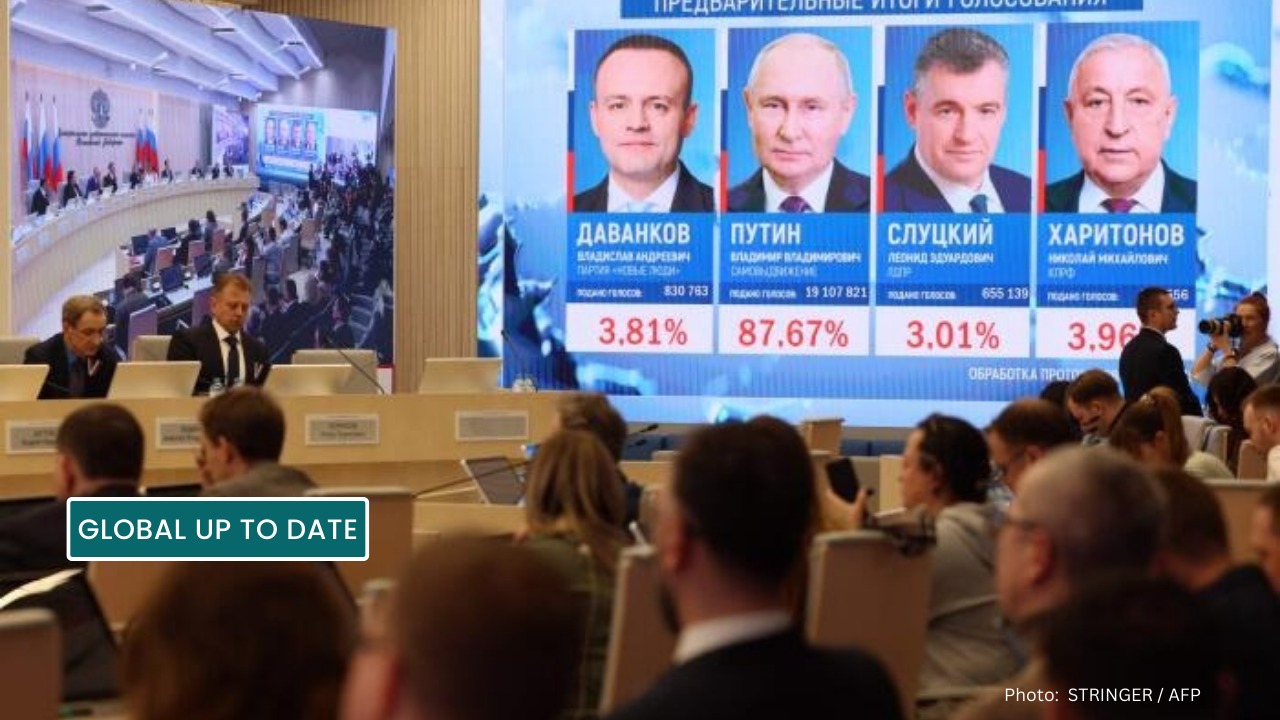Russia’s 8th Presidential Election: Putin Wins for The Record 5th Term Amidst Controversy
Piyal Raiyan Choudhury | 18 March 2024
Russian President Vladimir Putin has secured his 5th presidential term in the three-day-long 8th Presidential election, which was held on 15-17 March, spreading controversies due to the lack of credible opposition. The ‘new’ elected president won an overwhelming majority, with a resounding 87.85% of the vote on a voter turnout of 77.5%, which is an all-time record, surpassing the 2018 turnout rate of 67.5%, as reported by the Central Election Commission (CEC). The result means that Putin extended his rule for six more years until 2030 and will overtake his fellow compatriot Joseph Stalin to become Russia’s longest-serving elected leader before his term ends.
In Russia, the presidential election used to be held every four years, which was extended to six years in 2008 by constitutional amendment. Later, in 2020, another constitutional amendment removed presidential term limits, allowing Putin to retain his presidency until 2036.
The 8th presidential election is widely criticised and regarded as illegitimate, in light of a few specific factors. The continuance of Putin was predetermined, as it was quite evident that there was no real competition. All of the credible opponents and critics were either jailed, exiled, or dead, which made Putin’s victory much anticipated.
Three primary registered candidates stood against Putin in the presidential election. While it was a landslide victory for the incumbent president, with a record number of votes, his closest opponent Nikolay Kharitonov from the Communist Party came second with merely 3.86%. New People candidate Vladislav Davankov came third with 3.76%, and Leonid Slutsky from the Liberal Democratic Party came fourth with 2.97%, according to the first estimates of the presidential election result at the Central Electoral Commission (CEC).
Critics from the West speculated whether Putin is a legitimate leader of Russia, given the absence of any true opposition and the laughable margin of victory. The three quasi-opponents who stood against Putin have a history of supporting him and Russia in the full-scale war against Ukraine, which he launched in 2022. Therefore, they didn't truly oppose the Russian leader or put up much of a fight in the campaign as expected.
The campaign received criticism as anti-war candidates were disqualified or barred from running. The real opposition was annihilated by years of despotism. Alexei Navalny, aged 47, one of Vladimir Putin’s real political foes, was barred from running on the grounds of a prior criminal conviction, suspiciously died weeks before the election in a highly secured Arctic penal colony, a death seen as politically motivated by international observers worldwide.
Widely speculated by Navalny’s family and supporters that he was murdered in prison by the Kremlin, an accusation which the Kremlin has outright rejected. The allies of Navalny are either jailed or exiled from Russia. YuliaNavalnaya, the widow of Alexei Navalny, wrote her late husband’s name on the ballot at the Russian embassy in Berlin while casting her vote. She urged Navalny's allies to participate in the “Noon Against Putin” initiative, inspired by the late prominent Russian opposition leader in his last political statement. The initiative was meant to be a peaceful protest by people who did not support Putin, encouraging them to come to the polling stations at noon and vote against him.
Boris Nadezhdin, 60, another anti-war activist who wanted to run for the presidential election, was disqualified by the Central Election Commission (CEC) in February. Yekaterina Duntsova, 40, who also had the inclination to run for the campaign and was vocal against the war with Ukraine, was disqualified by the commission in December.
The election witnessed acts of defiance from Putin’s opponents both inside and outside Russia. As stated by Josep Borrell, the EU Foreign Chief, the election wasn’t “free and fair.” Russia held voting in the occupied territories of Ukraine, as the Kremlin considers the residents Russian citizens and voters. The harshest criticism came from Ukrainian President Volodymyr Zelenskyy: “There is not a single bit of legitimacy in this simulation of an election, and there can't be. This act should be on trial in The Hague.” Germany also didn’t hold back; Christina Hoffmann, Chancellor Olaf Scholz’s spokeswoman, referred to the Russian regime as a “dictatorship” and “authoritarian”.
Amidst all these criticisms and controversies, Russia’s relations with China, India, Iran, and North Korea have deepened, and their leaders have also congratulated Putin on his victory through press briefings or statements. Countries with historic ties to Russia, such as Azerbaijan and Belarus, also appeared to be joyful about the victory of President Vladimir Putin.
What's next? The Russian President has won a resounding mandate, firmly giving him the confidence to stick with his current path, far from the philosophy of the West. How the prolongation of Putin's rule will affect geopolitics is a question to be answered in the coming years. Unless the West finds a way to reconcile with Russia, the world may be in for a rough few years.
Piyal Raiyan Choudhury is a graduate in Public Administration from the University of Dhaka.
The views expressed in this write-up are solely those of the author and do not necessarily reflect the policies of CGS.
